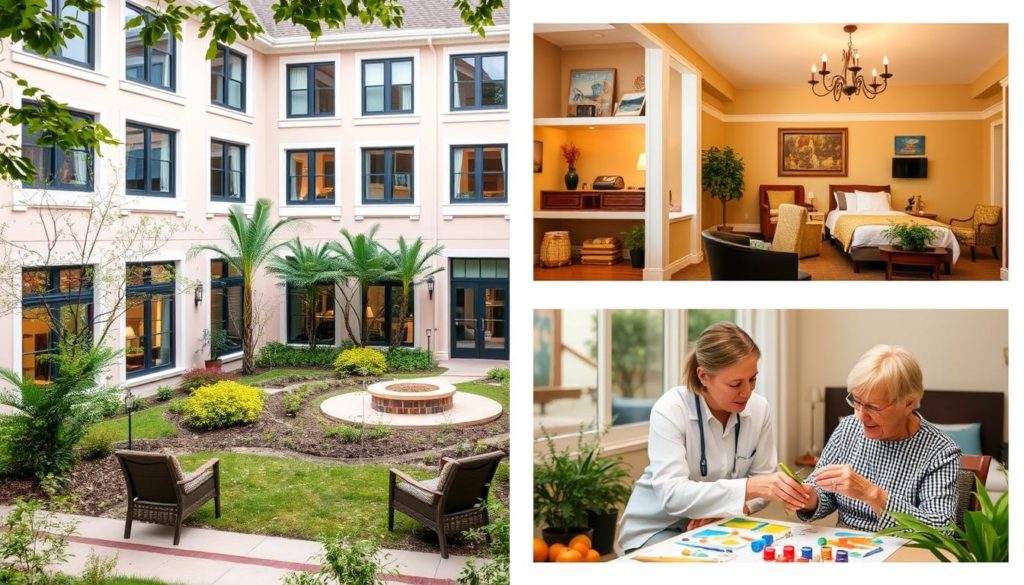Did you know almost 6 million people in the U.S. have Alzheimer’s disease? Experts say this number will keep growing. This shows the urgent need for specialized Alzheimer’s care, more than what usual senior living offers. Alzheimer’s assisted living facilities are made for this reason. They provide a caring place for individuals to do well.
These places aim to feel like home, with top-notch amenities and 24/7 watching. Everything is carefully set to make a safe, secure area for those living there. The care given is full of compassion. It’s tailored to each person, valuing their dignity. It meets the special needs of those with different kinds of dementia.
Understanding Alzheimer’s and Dementia
Dementia means a steep decline in thinking skills, badly affecting daily life. Alzheimer’s disease is the most common cause. Dementia care services play a key role in helping those with this condition.

Different Types of Dementia
Alzheimer’s disease is well-known but it’s just one kind of dementia. Others include:
- Lewy body dementia
- Vascular dementia
- Frontotemporal dementia
It’s important to understand these types to give the right care. For instance, Alzheimer’s care communities offer specific programs for each kind.
Symptoms and Progression of Alzheimer’s
Symptoms of Alzheimer’s start with simple memory loss, then get worse. They make everyday tasks hard, showing the need for specialized care.
Those with Alzheimer’s do better in care communities. There, they get activities and routines designed for their needs. This helps slow down the disease’s impact, improving life quality.
Benefits of Memory Care Assisted Living
Choosing memory care assisted living brings many advantages for those with dementia. It includes personalized care plans, engaging cognitive activities, and safe environments for dementia patients. These features work together to better the lives of residents.

Personalized Care Plans
Personalized care plans are a key benefit of memory care assisted living. Each plan is designed to meet the individual’s needs, likes, and health issues. They are regularly updated to adapt to any changes, ensuring ongoing and suitable support.
Engagement Through Cognitive Activities
In these facilities, a big focus is on cognitive activities that keep the mind sharp and slow down dementia. Residents get to join in on games, puzzles, and group talks. These activities are great for thinking skills, making friends, and building a community feeling.
Safe and Secure Environments
Keeping residents safe is a top concern in memory care. The setup of safe environments for dementia patients helps stop wandering and makes sure everyone is secure. Featuring emergency systems, watched exits, and routine safety inspections, they offer comfort to families and residents alike.
| Feature | Benefit |
|---|---|
| Personalized care plans | Customized to individual needs and evolving conditions |
| Cognitive activities | Maintain mental agility and foster social interaction |
| Safe environments | Prevent wandering and ensure 24/7 security |
Key Features of Alzheimer’s Care Communities
Alzheimer’s care communities are tailor-made to assist residents at every step. They focus on providing effective support throughout the journey. Here are three main features that make these communities great in offering quality care.
24-Hour Monitoring
These communities ensure the highest safety with 24-hour Alzheimer’s monitoring. Constant oversight means residents get care day and night. Families feel at ease knowing their loved ones are continuously watched, even during sleep and meals.
State-of-the-Art Facilities
The dementia care facilities boast cutting-edge designs. They help reduce confusion and increase comfort for those living there. With rooms built for their needs, advanced security, and targeted therapies, these places cater well to Alzheimer’s individuals.
Professional and Compassionate Staff
The staff are not just trained; they’re also full of compassion. The trained memory care staff usually have over ten years’ experience and hold key certifications. They focus on giving personalized care to ensure each resident’s comfort and health.
What to Look for in an Alzheimer’s Assisted Living Facility
Finding the right Alzheimer’s assisted living place is crucial. It greatly affects the care and happiness of your loved one. There are important features to look for in a good facility.
Staff-to-Resident Ratio
The resident care ratio is very important to check. A lower ratio means more personalized care for each resident. This helps ensure your loved one gets the attention and support they need, even as their condition changes.
Range of Available Services
It’s key to find a facility with many services. Look for places that offer medical care, fun activities, and special treatments. They should meet the changing needs of your loved one as time goes on.
Family Involvement Policies
How much families can be part of care matters a lot for the resident’s well-being. Good policies help families stay involved. They include updates, meetings, and ways for families to help plan and make decisions about care.
| Factors | Details |
|---|---|
| Resident Care Ratio | Low staff-to-resident ratio for personalized care |
| Alzheimer’s Assisted Living Amenities | Comprehensive range of medical, social, and therapeutic services |
| Family Participation in Dementia Care | Policies that encourage and support active family involvement |
The Importance of Specialized Alzheimer’s Care
Specialized Alzheimer’s care is crucial for tackling the unique challenges of Alzheimer’s and other dementias. Facilities offering advanced dementia care are set up to deal with the behavioral changes and the need for intensive supervision. These places are designed carefully to keep residents safe and help them get around easily.
One big advantage of specialized Alzheimer’s care is the therapeutic activities made just for each person’s cognitive abilities. These activities help keep the mind active and encourage socializing, which is key for emotional health. Caregivers are specially trained to provide professional Alzheimer’s support, making sure residents get care that is both kind and effective.
Memory care facilities also focus on personalized attention and customized care plans for each resident. This tailored approach is critical for managing dementia’s progression well. Families can trust that their loved ones are in places that put safety and well-being first with specialized Alzheimer’s care.
The cost of memory care varies by region and needed care level. Detailed info about memory care home costs in Florida helps families choose the best care for their loved ones.
How Assisted Living for Alzheimer’s Supports Independence
Assisted living communities for those with Alzheimer’s aim to support independence. They do this by creating a home-like setting. This mixes daily routines with familiar environments. It makes residents feel safe and secure while meeting their dementia-related needs.
Daily Routines and Familiar Surroundings
Daily routines for Alzheimer’s patients are vital. They help keep residents oriented and less agitated. These routines cover personal care, eating times, and suitable activities.
Having personal items and photos around makes surroundings familiar. This comforts residents. Routine and a familiar setting give them a sense of normalcy, which is key for independence. For more on care levels, click here.
Physical Fitness and Mobility Assistance
Exercise is part of the daily plan to boost both physical and mental health. Supporting mobility is crucial to prevent physical decline, which can worsen cognitive issues.
There are guided walks, group exercises, and physical therapy. These help improve strength, balance, and fitness. Hence, residents keep their mobility and independence.
| Aspect | Key Benefits |
|---|---|
| Daily Routines and Familiar Surroundings | Reduces agitation, fosters comfort, reinforces a sense of normalcy |
| Physical Fitness and Mobility Assistance | Maintains physical health, enhances mental well-being, supports mobility |
Choosing the Right Senior Living for Memory Care
Choosing the right memory care is vital. It begins with careful initial consultations and assessments. This ensures the individual’s needs are fully understood and met.
Initial Consultations and Assessments
Initial dementia assessments are key for personalized Alzheimer’s care plans. They consider the medical, emotional, and daily needs of seniors. These evaluations build the basis for an effective care strategy.
Creating a Care Plan Tailored to Needs
Care providers create customized Alzheimer’s care plans from initial assessments. These plans are flexible, meeting the changing needs of those with dementia. Tailored plans improve memory care quality, offering comfort and individual support.
| Initial Assessments | Tailored Care Plans |
|---|---|
| Evaluates medical history | Personalized medical management |
| Understands emotional needs | Customized therapeutic activities |
| Assesses daily living skills | Adapted daily routines |
Memory Support Services Offered in Assisted Living
Assisted living facilities provide special memory support for those with Alzheimer’s and dementia. These services help senior residents live safely and happily. They also maintain their dignity in the community.
Hygiene and Medication Assistance
One important service is dementia hygiene assistance. It covers daily grooming, bathing, and cleanliness. This is vital for the well-being of residents. Moreover, Alzheimer’s medication management ensures correct medication use. It helps manage symptoms and avoids health problems from wrong doses.
Socialization and Recreational Activities
Active engagement in social activities for seniors is key. It prevents loneliness and supports mental health. These activities are made for people with dementia. They help create a community and better life quality for the residents.
| Service | Description |
|---|---|
| Dementia Hygiene Assistance | Daily grooming, bathing, and personal cleanliness support to enhance overall well-being. |
| Alzheimer’s Medication Management | Professional oversight and administration of prescribed medications to ensure proper usage. |
| Social Activities for Seniors | Engaging and tailored activities to encourage social interaction and prevent isolation. |
Finding Alzheimer’s Care Accommodations in the United States
Starting the search for Alzheimer’s care accommodations in the United States requires thorough research. Consider the location of potential facilities first. Being close to family is important for both the patient and their loved ones.
Accessibility matters for easy visits and involvement in the care process. This ensures a better quality of life.
It’s also vital to check the facility’s reputation. Look at reviews online and ask for advice from organizations and healthcare professionals. These resources offer insights and help in finding the right Alzheimer’s support.
When looking for top dementia care facilities in the USA, evaluate their services. Make sure they provide personalized care plans and cognitive activities. A secure environment is crucial.
By considering these aspects, you can find a facility that not only meets but exceeds expectations in Alzheimer’s care.
FAQ
What is the primary focus of assisted living for Alzheimer’s?
Assisted living for Alzheimer’s aims to give specialized care. This care is for people with Alzheimer’s or other dementias. Facilities feel like home and have top-notch amenities for safety and comfort.
What types of dementia are there?
There are several types of dementia besides Alzheimer’s. These include Lewy body, vascular, and frontotemporal dementia. Each type has unique symptoms and how it gets worse over time.
How does Alzheimer’s disease progress?
Alzheimer’s starts with mild memory problems and gets worse over time. Early on, a person might forget things and get confused. Later, they face major changes in behavior and struggle with daily tasks.
What are the benefits of memory care assisted living?
Memory care offers tailored care plans and activities like puzzles to keep the mind active. It provides safe places to live, help with daily tasks, ways to meet people, and fitness programs.
What features should I look for in an Alzheimer’s care community?
Look for 24-hour monitoring, facilities that help reduce confusion, and caregivers who are kind and know a lot about dementia.
Why is the staff-to-resident ratio important in an Alzheimer’s assisted living facility?
A lower ratio means more personal care and attention for each person. This helps meet their unique needs better and improves their life.
What services are typically available in an Alzheimer’s assisted living facility?
These places offer full dementia care, help with everyday tasks, and managing medicines. There are also fun and social activities, and ways for families to be involved in the care.
How does specialized Alzheimer’s care differ from general senior care?
Specialized care for Alzheimer’s focuses on the specific challenges it brings. It provides structured places to live, safety features, help with finding your way, and activities to handle behavior and memory problems.
How do assisted living facilities support independence for residents with Alzheimer’s?
They keep everyday routines and provide familiar places to help manage dementia. They also help with physical health and getting around to keep people active and part of the community.
What should be considered during initial consultations and assessments for memory care living?
It’s important to fully understand the person’s needs. This makes sure the care plan fits them well and changes as needed for the best care.
What memory support services are offered in assisted living?
Services include help with personal care and medicines, doing fun activities to meet others, and help with everyday tasks, all designed for those with memory problems.
How can I find Alzheimer’s care accommodations in the United States?
Start by researching facilities and checking their quality of care and location. Help from local groups, care experts, and doctors can point you to the right place for your loved one.


